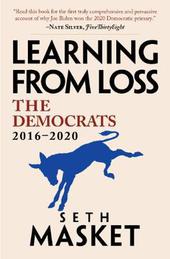
|
Learning from Loss: The Democrats, 2016-2020
Hardback
Main Details
| Title |
Learning from Loss: The Democrats, 2016-2020
|
| Authors and Contributors |
By (author) Seth Masket
|
| Physical Properties |
| Format:Hardback | | Pages:256 | | Dimensions(mm): Height 237,Width 158 |
|
| ISBN/Barcode |
9781108482127
|
| Classifications | Dewey:324.2736090512 |
|---|
| Audience | | General | | Professional & Vocational | | Tertiary Education (US: College) | |
|---|
| Illustrations |
Worked examples or Exercises
|
|
Publishing Details |
| Publisher |
Cambridge University Press
|
| Imprint |
Cambridge University Press
|
| Publication Date |
22 September 2020 |
| Publication Country |
United Kingdom
|
Description
The Democrats' decision to nominate Joe Biden for 2020 was hardly a fluke but rather a strategic choice by a party that had elevated electability above all other concerns. In Learning from Loss, one of the nation's leading political analysts offers unique insight into the Democratic Party at a moment of uncertainty. Between 2017 and 2020, Seth Masket spoke with Democratic Party activists and followed the behavior of party leaders and donors to learn how the party was interpreting the 2016 election and thinking about a nominee for 2020. Masket traces the persistence of party factions and shows how interpretations of 2016 shaped strategic choices for 2020. Although diverse narratives emerged to explain defeat in 2016 - ranging from a focus on 'identity politics' to concerns about Clinton as a flawed candidate - these narratives collectively cleared the path for Biden.
Author Biography
Seth Masket is Professor of Political Science and Director of the Center on American Politics at the University of Denver. Masket writes regularly for Mischiefs of Faction and FiveThirtyEight. His work has also appeared in Politico, the New York Times, the Los Angeles Times, and the Washington Post's Monkey Cage. He is the author of The Inevitable Party: Why Attempts to Kill the Party System Fail and How They Weaken Democracy (2016) and No Middle Ground: How Informal Party Organizations Control Nominations and Polarize Legislatures (2009).
Reviews'Read this book for the first truly comprehensive and persuasive account of why Joe Biden won the 2020 Democratic primary. Masket also deftly explains how political parties are adapting to the modern media landscape, and how they can sometimes overreact based on stylized interpretations of the facts ('narratives') that may not match the more complicated reality. Masket shows why Biden's comeback win wasn't nearly as surprising as the conventional wisdom seemed to hold.' Nate Silver, editor-in-chief, FiveThirtyEight 'Combining the sophistication of a political scientist with the readability of a political journalist, Seth Masket sets out to explore the stories Democrats have told themselves about their catastrophic loss to Donald Trump. He returns with a vividly detailed MRI scan of the Democratic mind. The party, he finds, is vexed less by ideological disagreements than by persistent tensions over identity politics, class, and race. If you want to understand what Democrats thought they learned in 2016, and why they bet everything on an old white guy in 2020, you need to read this book.' Jonathan Rauch, Brookings Institution 'Seth Masket has written an engaging, illuminating and thought-provoking book, one that adeptly combines broad theoretical sweep with fine granular detail. This rigorous and original study sheds valuable light on timely - and timeless - debates in American politics.' Molly Ball, TIME national political correspondent and author of Pelosi 'Seth Masket revisits The Party Decides with a fascinating and persuasive analysis of the 2016 and 2020 presidential nominations. This book will quickly become the go-to source for understanding when and how parties succeed or fail in choosing their presidential nominees.' Thomas E. Mann, Brookings Institution, co-author of One Nation After Trump and It's Even Worse Than It Looks 'This book is a must-read for anyone interested in the long-term impact of the 2016 election on American party politics. Masket takes us into the heads of state party activists, showing how their perceptions of the 2016 result shaped nomination politics in 2020.' Julia R. Azari, Marquette University 'Seth Masket has written a timely and important book on what was perhaps the most central question of the 2020 Democratic presidential nomination: Why did 2016 turn out the way that it did? That question has dominated commentary for four years, but Masket focuses on it from a particularly important perspective: Why do Democrats think that Democrats lost a race that they thought they could win?' Hans Noel, Georgetown University 'There's no better guide to the 2020 Democratic Party nomination process than Seth Masket. Learning from Loss shows how explanations for Hillary Clinton's 2016 loss - accurate or not - set the stage for activists' judgments of the 2020 candidates, paving the way for Joe Biden's nomination.' Matt Grossmann, Michigan State University 'Catnip for election watchers and politics junkies, who will want to reread the book when the dust of 2020 settles.' Kirkus 'Masket ... delivers a meticulous and lucidly written analysis of how Democratic insiders came to believe Joe Biden should be the party's candidate in the 2020 presidential election.' Publishers Weekly 'Seth Masket's masterful Learning From Loss: The Democrats, 2016-2020 provides a wealth of useful insights for understanding the Democrats' likely trajectory over the coming years, as well as the strategic decisions progressives must grapple with as they seek to expand their influence on Democratic Party politics.' Jared Abbott, Jacobin '... Learning from Loss offers a compelling, highly readable account of recent Democratic Party history ... will continue to interest scholars and students for many years to come.' Frances E. Lee, American Politics 'Learning from Loss bridges multiple audiences ... Packed with pithy quotations, the book will appeal to general-interest audiences beyond academia.' Frances E. Lee, Perspectives on Politics
|